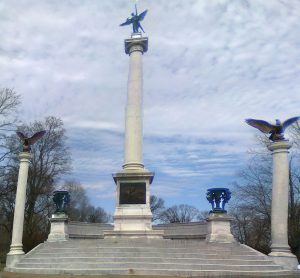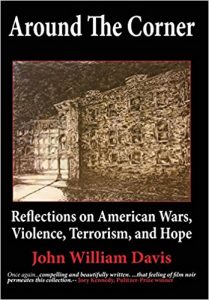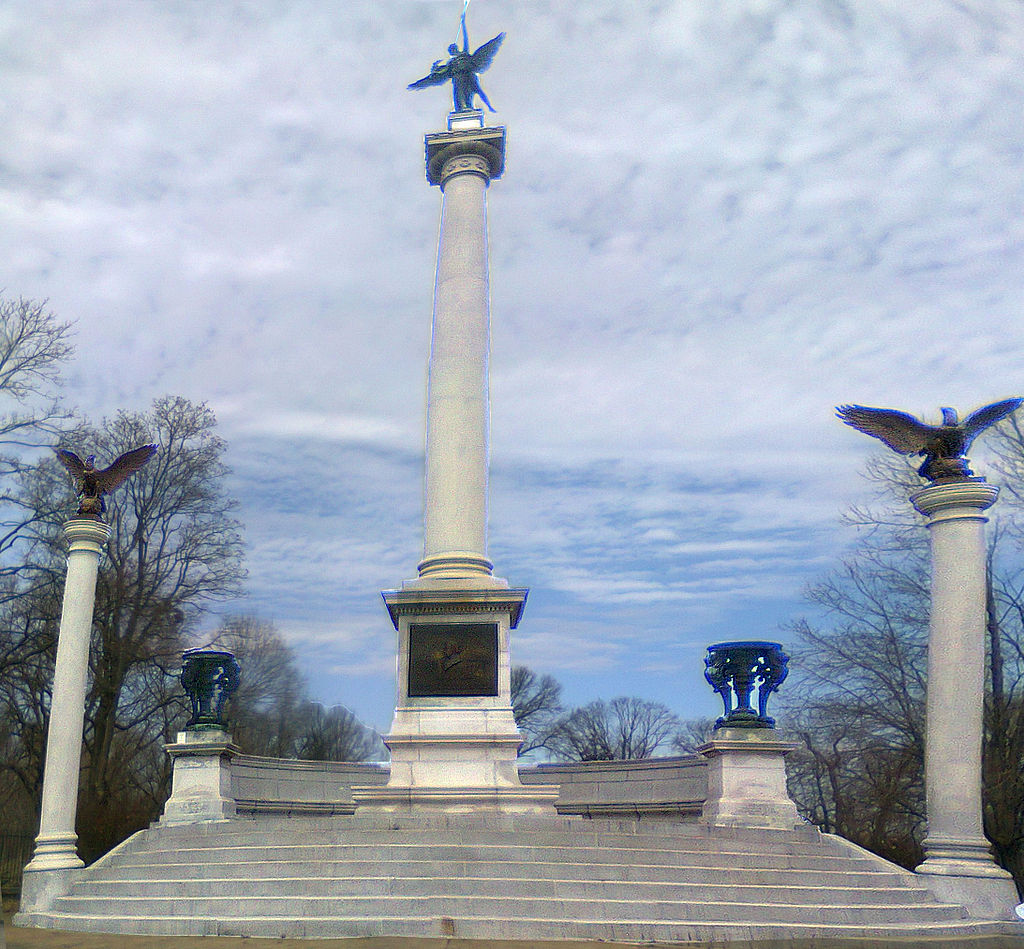Article Written by John Davis

Elijah P. Lovejoy was a man of deep, almost puritanical faith. Born in Maine on the 9th of November, 1802, he was later educated as a school teacher. As he set off into the world, however, he failed at every teaching job he tried. As a young man in a growing country, a benefactor helped him move West, to the lands of Illinois. Again, failure met his every attempt to teach. Even when he crossed the Mississippi into St. Louis, Missouri, he could not make a decent living.
He subsisted on occasional published articles. Worse, he wrote his family and friends, he felt engaged in a daily battle with corruption, evil, and sin. He feared for his soul. Nothing and no one could point him toward a path of redemption, so he returned back East, there to become a Presbyterian Minister.
In time, he returned to St. Louis, and began a problematic career as editor of a start-up religious paper, the The St. Louis Observer. In it, he denounced sin, alcohol, tobacco, and other denominations. This garnered few friends, and a host of enemies. After much controversy caused by his extreme views, a true conflict arose when he took up the cause of anti-slavery.
Lovejoy believed God called him to oppose slavery, and he intended to confront it quite literally in the bustling Missouri river town of St. Louis, Missouri, his new home. Missouri was a slave state, and there Lovejoy planned to proclaim God’s will.
The mystery of Mr. Lovejoy’s life revolves around four printing presses. His press was located in a building not far from the river’s edge. (This place no longer exists, destroyed along with the old warehouses along the levee to construct the St. Louis Arch in the 1960’s.) Lovejoy’s abolitionist views became more strident, as he used The Observer to proclaim God’s opposition to slavery to St. Louisans ill disposed to hear it. And so the crisis of his life began.
A free black man, Francis McIntosh, was asked to help quell a fight on the waterfront. He refused to participate. Accused of not helping two policemen, he was placed in prison some blocks away. When he asked how long he’d be in jail, some said five years. He stabbed two police, killing one, and fled. Recaptured, he was dragged from prison by a white mob, who tied him to a nearby tree. They piled branches around him, and burned him alive. He died singing a hymn as the slow burning fire murdered him, finally begging those among the hundreds of bystanders to ‘Shoot me! Shoot me!.”
Lovejoy blasted away in print. He denounced the miscarriage of justice in the Observer. In time the case came to a grand jury. The presiding judge, ironically named Lawless, noted that since no individuals were identified at the scene, it was thus spontaneous mob action and therefore no case could be brought. And, Lawless advised the jurors, McIntosh’s case was typical of how free blacks were being turned against their white brethren by the likes of abolitionists such as Elijah P. Lovejoy.
Lovejoy did indeed denounce the crime, and also the hypocrisy: He wrote, “It is the day of our Nation’s birth. Even as we write, crowds are hurrying past our window in eager anticipation to the appointed bower, to listen to the declaration that, ‘ All men are created equal…..Alas, what a bitter mockery is this; we assemble to thank God for our own freedom, and to eat with joy and gladness of heart, while our feet are on the necks of nearly 3,000,000 of our fellow-men. Not all our shouts of self-congratulation can drown their groans; even the very flag which waves over our head is formed of material cultivated by slaves, on a soil moistened by their blood, drawn from them by the whip of a republican task-master.”
A mob, reading Lovejoy’s accounts of these events, marched on the Observer and threw his printing press in the Mississippi. Lovejoy, though unrepentent and still fired with renewed zeal, nevertheless in fear for his family moved across the river to Alton, in the free state of Illinois. But all was not well.
He continued his denunciations of slavery. He said with the same fervor that he would speak freely, as an American, for which the Constitution protected him. “I plant myself down on my unquestionable rights, and the question to be decided is, whether I shall be protected in these rights? That is the question. You may hang me as the mob hung the individual at Vicksburg. You may burn me at the stake as they did old Mclntosh in St. Louis…the deepest of all disgrace would be at a time like this to deny my Maker by forsaking His cause. He died for me, and I were most unworthy to bear His name should I refuse, if need be, to die for Him.”
Again his presses were thrown into the Mississippi, this time by pro-slavery Illinoisians. Undeterred, Lovejoy was sent another printing press from admirers in New England. Again the citizens decided enough was enough and threw his new presses in the river. He declaimed even more stridently, “We distinctly avow it to be our settled purpose, never, while life lasts, to yield to this new system of attempting to destroy, by means of mob violence, the right of conscience, the freedom of opinion, and of the press.”
Again Lovejoy denounced slavery, slavers, and how free men should not abide such an evil. At last, Lovejoy’s fourth printing press arrived, unannounced, and was secreted in a warehouse in Alton. Somehow the mob got word, and went to destroy it. They were met by opposition, by Lovejoy and his colleagues armed and in the building. The mob swarmed against the edifice, and in the melee Lovejoy was shot, five times, by shotgun blasts. In the chaos, the new press was dumped unceremoniously into the Mississippi. He died a martyr in November 1837, the first American journalist to die in defense of the American free press. No one carried his body away for a day. He was buried in secret, for fear of the mob.
Today his body is buried in a well kept cemetery in Alton. There is a grand monument now to this first victim in defense of our freedom of speech and the free press. No one ever found any of his printing presses, thrown into the Mississippi. Brave men and women of the American press today bravely take up his cause that free Americans should be protected in their exercise of free speech. They comment on today’s affairs with the same courage as Abraham Lincoln who said, referring to Lovejoy and McIntosh, “….whenever the vicious portion of [our] population shall be permitted to gather in bands of hundreds and thousands, and burn churches, ravage and rob provision stores, throw printing-presses into rivers, and shoot editors, and hang and burn obnoxious persons at pleasure and with impunity, depend upon it, this government cannot last.” We owe Mr. Lovejoy a debt of gratitude.
~Article written by John Davis
Read More from John
 John William Davis is a retired US Army counterintelligence officer and linguist. As a linguist, Mr. Davis learned five languages, the better to serve in his counterintelligence jobs during some 14 years overseas. He served in West Germany, Italy, and the Netherlands during the Cold War. There he was active in investigations directed against the Communist espionage services of the Soviet Union and Warsaw Pact. His mission was also to investigate terrorists such as the Red Army Faction in Germany, the Red Brigades in Italy, and the Combatant Communist Cells (in Belgium) among a host of others.
John William Davis is a retired US Army counterintelligence officer and linguist. As a linguist, Mr. Davis learned five languages, the better to serve in his counterintelligence jobs during some 14 years overseas. He served in West Germany, Italy, and the Netherlands during the Cold War. There he was active in investigations directed against the Communist espionage services of the Soviet Union and Warsaw Pact. His mission was also to investigate terrorists such as the Red Army Faction in Germany, the Red Brigades in Italy, and the Combatant Communist Cells (in Belgium) among a host of others.
His work during the Cold War and the bitter aftermath led him to write Rainy Street Stories, ‘Reflections on Secret Wars, Terrorism, and Espionage’ . He wanted to talk about not only the events themselves, but also the moral and human aspects of the secret world as well.

And now recently published in 2018, John continued his writing with Around the Corner: Reflections on American Wars, Violence, Terrorism, and Hope.
Two powerful books worth reading.
Read more about them in the following Six Questions:
Six Questions with John Davis: Author of Rainy Street Stories
Six Questions with John Davis: Author of Around the Corner
Best of luck with all that you seek! Always Treasure the Adventure!


My school had a building named for this guy. It would be interesting to know if any attempt has ever been made to locate those presses, say by magnetometer. In a somewhat similar vein, a pro-slavery publisher in Portsmouth, NH had his presses destroyed by an abolitionist mob. The building that housed his newspaper still exists-
Dear Madesquare, When we read the actual events of those days, it is impressive how brutal, relentless, and uncompromising some people were. We see where it all led, once the voices of reason and compromise were shouted down. Like you, I wonder about those presses. Seems it would be a museum quality item which would have withstood the rigors of the river if recovered today.